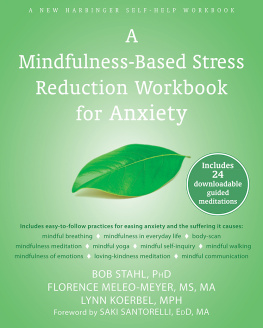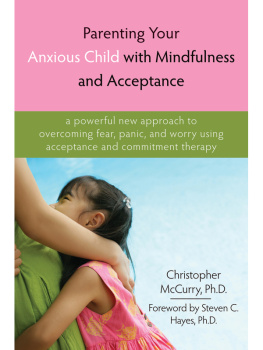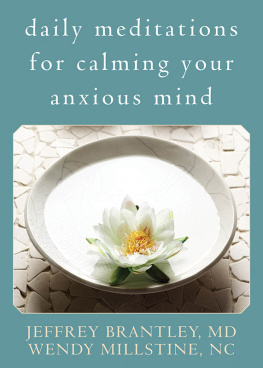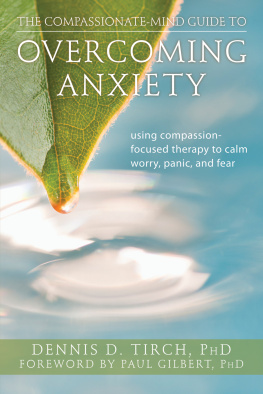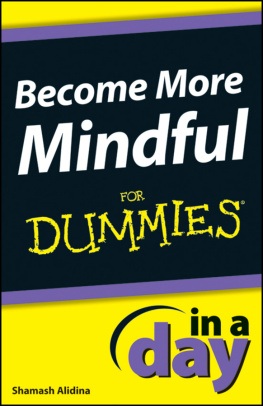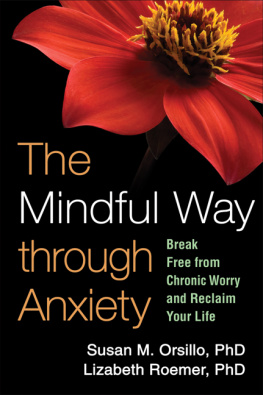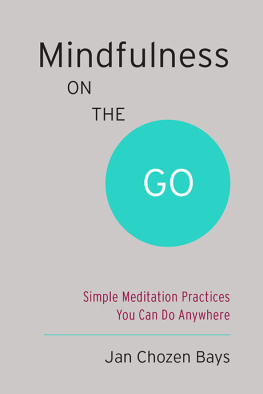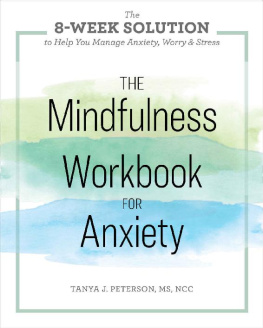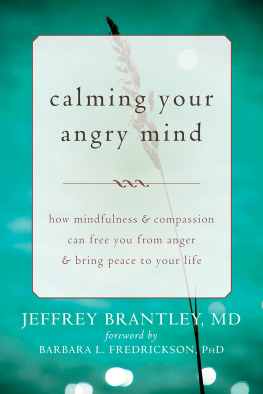
Jeffrey Brantley, MD, is a consulting associate in the Duke Department of Psychiatry and the founder and director of the Mindfulness-Based Stress Reduction Program at Duke Universitys Center for Integrative Medicine. He has represented the Duke MBSR program in numerous radio, television, and print interviews. He is coauthor of Five Good Minutes, Five Good Minutes in Evening, Five Good Minutes at Work, and The Dialectical Behavior Therapy Skills Workbook.
Foreword writer Jon Kabat-Zinn, Ph.D., is the author of numerous books, including Full Catastrophe Living and Coming to Our Senses.

Publishers Note
This publication is designed to provide accurate and authoritative information in regard to the subject matter covered. It is sold with the understanding that the publisher is not engaged in rendering psychological, financial, legal, or other professional services. If expert assistance or counseling is needed, the services of a competent professional should be sought.
Distributed in Canada by Raincoast Books
Copyright 2007 by Jeffrey Brantley
New Harbinger Publications, Inc.
5674 Shattuck Avenue
Oakland, CA 94609
www.newharbinger.com
Cover design by Amy Shoup; Cover Image by Brand X Pictures/Jupiter Images;
Text design by Michele Waters-Kermes; Acquired by Melissa Kirk; Edited by Gail Saari
Poem from the book She Had Some Horses by Joy Harjo. Copyright 1983, 1997. Appears by permission of the publisher, Thunder Mouth Press, A Division of Avalon Publishing Group, Inc.
William Stafford, Being a Person from Even in Quiet Places. Copyright 1996 by William Stafford. Reprinting with the permission of Confluence Press.
David Budbill, Dont Speak in the Abstract from While Weve Still Got Feet. Copyright 2005 by David Budbill. Reprinted with the permission of Copper Canyon Press, P.O. Box 271, Port Townsend, WA 98368-0271.
All Rights Reserved.
ePub ISBN: 978-1-60882-124-2
Library of Congress Cataloging-in-Publication Data
Brantley, Jeffrey.
Calming your anxious mind : how mindfulness and compassion can free you from anxiety, fear, and panic / Jeffrey Brantley. -- 2nd ed.
p. cm.
ISBN 978-1-57224-487-0
1. Anxiety. 2. Fear. 3. Attention. 4. Meditation. I. Title.
BF575.A6B737 2007
152.4'6--dc22
2007008085
This book is dedicated to all whose lives are driven or constricted by fear, anxiety, or panic. May you find peace, and may that peace penetrate the entire world.
Foreword
It gives me great pleasure to introduce this book to you. Jeff Brantley is a devoted practitioner of mindfulness meditation and a longtime teacher of mindfulness-based stress reduction (MBSR). Dr. Brantley has a great deal of clinical experience in working with people suffering from chronic stress, pain, and illness, and in particular, with chronic anxiety. This book is a welcome introduction to mindfulness practice for all those who experience anxiety in their lives. That turns out to be just about all of us at one time or another. For anxiety is rampant in our age, a kind of cosmic background radiation impinging continually on our individual and collective psyches and amassing a deep cumulative tension in the body. Currents of anxiety can be behind the smallest things we choose to do or refrain from tryingat work, at home, and in our interior lives. Knowingly and unknowingly, anxiety can shape the very fabric and direction of our lives, whether we have a diagnosed anxiety disorder or not.
For regardless of how well-off or healthy we may seem to be to others or even to ourselves, being human, we are hardly immune, at least on occasion, to the mental state we know as fear and to the short- and long-term consequences it can have on the body and on how we carry ourselves and respond to stresses and challenges. For the most part, we tend to run from fear rather than to examine it. It remains unexamined precisely because it is so terrifying a prospect actually to take a peek at it, and to acknowledge to ourselves how fear-based our lives and our decisions can be, and how inexperienced we are at facing and freeing ourselves from the inner workings of such pervasive and potentially destructive mental states.
But taking a peek and letting yourself actually feel the fear in your body is worth doing, strange as that may at first seem. Anxiety, it turns out, can be a great teacher. And the lessons to be learned if we can be mindful, calm, and clear-sighted in the face of fear, anxiety, and perpetual worrying are profound. The minds anxious preoccupations, proliferations, vexations, and frustrations sometimes seem endless. But, as Dr. Brantley points out, they do not have to be ultimately confining or imprisoning. And over time, their volume in our lives can turn itself down considerably.
This book and the methods it presents can serve as a remarkable pathway to freedom from the imprisonment of chronic anxiety and panic, at whatever level they may manifest in your life. Mindfulness practice can serve as a doorway giving ready access to deep and profoundly healthy dimensions of your being that you may have been ignoring for too long, to what you might call your best self. It turns out you do not have to fix anything, or make anything go away to get in touch with yourself in this way. As you will learn in this book, all that is asked of you is that you start paying attention to aspects of your life and your immediate experience that you may have previously pretty much taken for granted. Several medical studies that we conducted on people with anxiety and panic disorder referred to our clinic for training in MBSR showed that the participants benefited enormously from this systematic cultivation of attention, as described in this book with great thoroughness and clarity by Dr. Brantley.
From the point of view of MBSR, no matter what has transpired in your life up to this point, no matter what you are facing, no matter what feels wrong, you are fundamentally okay, worthy, and secure in this very moment, even if you dont know it or feel it. This is so even when the outer world appears overwhelmingly disorienting and threatening, and even when the interior world of your own mind feels tumultuous and shaky. But of course, you have to test out for yourself whether this is indeed true. The great adventure of mindfulness is to discover or recover that intrinsic, spacious, secure, aware, innermost quality of your being, way deeper than your thoughts and feelings, and allow it to inform and guide the moment-to-moment conduct of your life, even, if not especially, when faced by great inner or outer turmoil.
This approach involves intentionally cultivating greater intimacy with the interior landscape of your lifethat is with your mind and your body and the breath that serves as a convenient link between them in the only moment you ever have, namely this one. That is what mindfulness offers you. It is not a matter of eradicating anxiety but rather becoming intimate with it through awareness because it is already here. In making room for it, you discover that the anxiety you are experiencing in any moment is not you, but merely a constellation of strongly habitual thoughts, feelings, and body sensations that you may be investing with a power they would not otherwise have over your life, and which might therefore severely restrict your options for responding effectively in situations you find stressful and which trigger these habitual patterns of reactivity. You discover you are mysteriously larger than these conditioned patterns hijacking the mind and body, and that your awareness of anxiety, fear, and worry is not anxious at all. It is already okay. Learning to inhabit your own awareness and deepen its scope and stability is a way to give you back to yourself and add significant degrees of freedom to your life.


